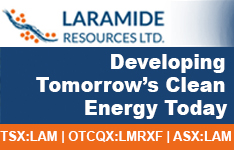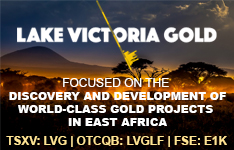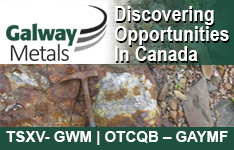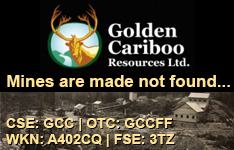The Mining Report: Rick Rule has called uranium the most hated commodity and, therefore, one of his favorite investments. However, we have started to hear good news about yellowcake, which is experiencing an uptick in spot price. What's causing that?
Brent Cook: We are seeing the recommissioning of nuclear plants in Japan, a process that should accelerate into 2015. China continues to build nuclear plants; there are roughly 70 new plants being built around the world and hundreds more planned or proposed, plus some of the excess supply has dwindled. Uranium is a long-term play. When I first started working with Rick back in 1997, uranium was the most hated commodity. It was quite a few years before his contrarian thesis was proven right. But when it was, share prices of the few legitimate uranium companies increased tenfold or more. I suspect that his thesis will be proven right again. I would agree that the uranium sector is a place to intelligently deploy some money into the good deposits and the good companies.
"Fission Uranium Corp. has the best new discovery we've seen in the Athabasca Basin in quite a long time."
TMR: Are the restarts in Japan more of a psychological push, or do they significantly impact supply and demand fundamentals? Some Japanese utilities were still buying uranium even while the nuclear reactors were shut down.
BC: I think you hit the nail on the head twice there. Restarts in Japan certainly were a boost to sentiment toward uranium, but fundamentally, the change in the Japanese government's view toward nuclear energy has also been positive. The major concern we had—that the 100 million pounds or so that the Japanese utilities held in storage would hit the market—no longer exists. In fact, they're going to have to start looking down the road to secure additional supply. So the positive is that the perceived supply overhang is gone, plus there is a good chance the utilities will be buying in 2015 and beyond.
TMR: Thomas Drolet advised our readers to focus on long-term contracts for a more accurate picture of supply and demand. It sounds as if you are leaning toward the same thing. Are utilities getting into the buying mood again?
BC: To some degree, yes, long-term contracts are where the majority of sales take place. Additionally, in 2014 more uranium was sold than in 2013, although there is some uncertainty between what has been reported at UxC and what Cameco estimated at its Investor Day in late November. Nonetheless, long-term contracts are up and I have every reason to think they will be up again in 2015. If—or I should say when—the long-term contract market volume reaches the pre-Fukushima levels of 2010, it will represent a doubling of demand and most certainly an increase in the uranium price.
"The change in the Japanese government's view toward nuclear energy has been positive for the uranium sector."
TMR: Much of your uranium portfolio is in the Athabasca Basin. Are some areas there better than others?
BC: The Athabasca Basin is a premier uranium producer, second only to Kazakhstan, and one of the best places to explore for additional deposits. However, not all deposits in the basin are created equally and one has to consider all the aspects that go into turning a deposit into a mine. It's not just grade. Deep high-grade deposits, although flashy, for the most part have not panned out. The actual cost of defining and developing them is substantial, plus the permitting hurdles and timeline mean you are looking at 10 years or more before the initial shaft is even started. What works best in the Basin are modest grade and shallow deposits amenable to open-pit mining, preferably hosted in basement rocks. Additionally, one has to look at access, infrastructure and transport between the mine and nearest mill. So, as usual, it is never as easy as the initial few drill holes make it look.
At Exploration Insights we own Denison Mines Corp. (DML:TSX; DNN:NYSE.MKT), which we received as a spinout from Fission Energy Corp., and now we own Fission Uranium Corp. (FCU:TSX). Fission has the best new discovery we've seen in the Athabasca Basin in quite a long time—it's near surface, it's mostly open pittable and it's good grade. [Editor's Note: This interview was conducted prior to the release of the resource estimate. The following is updated from Exploration Insights.]
"Fission just released a maiden resource estimate for the newly named Triple R deposit; it is impressive and better than most analysts (myself included) expected, 79.5 Mlb Indicated at an average grade of 1.58% U3O8 and 25.8 Mlb Inferred at an average grade of 1.3 U3O8.
The Triple R deposit is world class and will grow. Its relatively shallow depth and favorable host lithology are positive for its eventual development, but the presence of water and lack of a nearby mill will add to the capital and operating costs. Fission's winter program consists of an ~$10M infill and exploration drill program (~63 holes) plus engineering studies directed at producing a prefeasibility study, possibly by year-end.
In August 2011 Rio Tinto outbid Cameco for Hathor, paying US$642M or about US$11/lb U3O8 for the Roughrider deposit (MI&I 57 Mlb at 8.6% U3O8) located on the eastern Basin margin. Triple R is a considerably better deposit in a considerably worse market. Fission is being valued at ~CA$367M (US$310M)."
TMR: What about outside the Athabasca? Anything else you'd like to mention in the U.S.?
BC: I think the safest way to play equities in an increasing uranium price scenario is to stick to companies with legitimate and permitted deposits in relatively safe jurisdictions. Uranerz Energy Corp. (URZ:TSX; URZ:NYSE.MKT) has put its Nichols Ranch project in Wyoming into production recently. Although around half of the production has been sold forward at prices between about $45 and $60 per pound, this is still a leveraged play on the uranium price. I think that's one to watch.
Another U.S.-based company that is permitted to mine and produce uranium is Uranium Energy Corp. (UEC:NYSE.MKT). It owns the Hobson processing facility in Texas and a number of nearby in-situ leach deposits that could be put into production in very short order should the uranium price rise. It also controls a number of deposits scattered across the U.S. that add to its resource base.
"My investment thesis for the sector really hasn't changed much from last year at this time."
I'm not interested in any uranium exploration. There are enough uranium deposits sitting out there that are ready to go if the price rises. If you really want to play the uranium market, buy companies with decent resources or reserves near good infrastructure in a known province. I'm not going to go to Peru or Niger looking for uranium; it just doesn't make sense. We have plenty in the U.S., Canada and Australia.
TMR: Does Uranerz have the added benefit of giving that supply security to the U.S.?
BC: Yes, most definitely. I'm not sure if that's an issue or not, but some people think so.
TMR: Brent, you're scheduled to speak at the upcoming Cambridge Conference Jan. 18–19 in Vancouver. Could you give us a preview of some of the themes you'll be addressing?
BC: This year's event should provide an excellent opportunity to see just how bad, or good, the junior resource sector is doing. I suspect there will be far fewer companies and attendees than in previous years but, importantly, those attending are the survivors. My investment thesis for the sector really hasn't changed much from last year at this time. Times are tough, profits slim and money for exploration nearly nonexistent. Those circumstances make it much easier for those of us willing to put in the time to identify the few real bargains out there. Ultimately mining companies need new deposits to replace what is mined. If they are not looking, they will be buying.
TMR: One of the things that people look at in uranium, of course, is how it compares in price to natural gas, oil, coal and other sources of energy. What are you looking for in 2015? Will we have the same volatility we've had in 2014 or will things level out?
BC: My suspicion is that 2015 will look a lot like 2014, so it's going to be volatile in general and depressing in most of the commodities actually. How is that for a happy note to start the year?
TMR: That's OK. We want honesty. We love honesty.
BC: I own Fission and Denison. I own Denison because I think it set itself up as a strategic property owner with resources in the Athabasca. I think it's something that could get taken out. Fission, likewise, is an acquisition target with its PLS deposit. I want investments where I can see an exit strategy if things improve.
TMR: Brent, thanks for talking with us today.
Brent Cook brings more than 30 years of experience to his role as a geologist, consultant and investment adviser. His knowledge spans all areas of the mining business, from the conceptual stage through detailed technical and financial modeling related to mine development and production. Cook's weekly Exploration Insights newsletter focuses on early discovery, high-reward opportunities, primarily among junior mining and exploration companies.
Read what other experts are saying about:
Want to read more Mining Report articles like this? Sign up for our free e-newsletter, and you'll learn when new articles have been published. To see recent interviews with industry analysts and commentators, visit The Mining Report home page.
DISCLOSURE:
1) JT Long conducted this interview for Streetwise Reports LLC, publisher of The Gold Report, The Energy Report, The Life Sciences Report and The Mining Report, and provides services to Streetwise Reports as an employee. She owns, or his family owns, shares of the following companies mentioned in this interview: None.
2) The following companies mentioned in the interview are sponsors of Streetwise Reports: Fission Uranium Corp. and Uranerz Energy Corp. The companies mentioned in this interview were not involved in any aspect of the interview preparation or post-interview editing so the expert could speak independently about the sector. Streetwise Reports does not accept stock in exchange for its services.
3) Brent Cook: I own, or my family owns, shares of the following companies mentioned in this interview: Fission Uranium Corp. and Denison Mines Corp. I personally am, or my family is, paid by the following companies mentioned in this interview: None. My company has a financial relationship with the following companies mentioned in this interview: None. I was not paid by Streetwise Reports for participating in this interview. Comments and opinions expressed are my own comments and opinions. I determined and had final say over which companies would be included in the interview based on my research, understanding of the sector and interview theme. I had the opportunity to review the interview for accuracy as of the date of the interview and am responsible for the content of the interview.
4) Interviews are edited for clarity. Streetwise Reports does not make editorial comments or change experts' statements without their consent.
5) The interview does not constitute investment advice. Each reader is encouraged to consult with his or her individual financial professional and any action a reader takes as a result of information presented here is his or her own responsibility. By opening this page, each reader accepts and agrees to Streetwise Reports' terms of use and full legal disclaimer.
6) From time to time, Streetwise Reports LLC and its directors, officers, employees or members of their families, as well as persons interviewed for articles and interviews on the site, may have a long or short position in securities mentioned. Directors, officers, employees or members of their families are prohibited from making purchases and/or sales of those securities in the open market or otherwise during the up-to-four-week interval from the time of the interview until after it publishes.















































